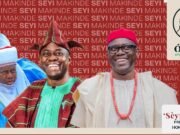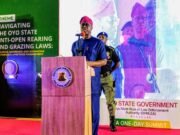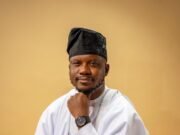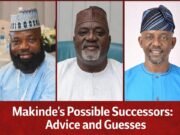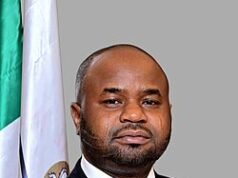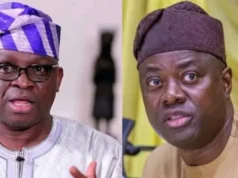This is politics. And in politics, anything is possible. But in Nigeria, this political possibility has taken a life of its own. In his seminal book, titled Nigeria: A New History of a Turbulent Century, Richard Bourne declared that “anyone who claims to understand Nigeria is either deluded or a liar”. Perhaps more accurately, anyone who claims to understand Nigerian politicians is either joking or ignorant. To understand the complexities and peculiarities of Nigeria and why its growth and development have remain stunted and stifled, observe its political space. For instance, and in a deeply profound way, both PDP and APC are somewhat birds of the same feathers. They have both run the country aground! That is why dumping one for the other is as seamless for shameless politicians as enjoying a bowl of ‘Amala’ and ‘Gbegiri’ plus assorted meat in the city of Ibadan.
Think of it this way: the trio of David Umahi of Ebonyi, Professor Ben. Ayade of Cross Rivers, Bello Matawalle of Zamfara were elected on the platform of PDP but today, they are in APC. Added to this is Chief Femi Fani Kayode, former Aviation Minister who just crossed to the party he called many unprintable names. There are Senators and Rep members who dumped their party for new one. A point to ponder: in politics, possibility is endless.
Take another surprisingly shocking example, an OBJ tearing his PDP membership card would be thought impossibly off-kilter but when he did, the world never ended. Or consider the bromance between former President Goodluck Jonathan and the then opposition leader Asiwaju Bola Ahmed Tinubu in 2011 elections. Tinubu had to ditched his party Presidential hopeful, Mallam Nuhu Ribadu to support the incumbent President.
Or think of the bloody dogfight between Ex Governors Rauf Aregbesola and Olagunoye Oyinlola and their peace accord in 2014 Osun Gubernatorial elections. Or consider the Adam Oshiomole and Pastor Osagie Ize-Iyamu name calling and eventual mollycoddling in the last Edo governorship election. In a way, Nigeria politics is littered with litany of unimaginably possibility and plausible political counterbalance.
This also helps explains why politicians are some of the most optimistic people on earth. Dissecting the differences between an optimist and a pessimist, Psychologist, Professor Martin Seligman contends that “what makes a pessimist and optimist lies mostly in their explanatory style”. For a pessimist, he writes, setbacks or misfortune or tragedy are often described from a personal, permanent and pervasive perspective”. When a pessimist lost a contest for instance, he blames himself, see it as something permanent (which will stop him from future contests) and considered it pervasive, that is, something that will wreak havoc on his life.
But an optimist clearly look at setback from an objective and accurate lens. He takes blame where necessary but doesn’t attribute everything to himself. He also understand setbacks to be temporary, a storm that will soon fade away and hardly believe a single life event will destroy him completely. “Life inflicts the same setbacks and tragedies on the optimist as in pessimist”. Seligman continues in his book with a punchy title: learned optimism “but the optimist weather them better”. When we encounter adversity, he further, we react by thinking about it. Our thoughts rapidly congeal into beliefs. These beliefs may become so habitual we don’t even realize we have them unless we stop and focus on them. And they don’t just sit there idly; they have consequences. The beliefs are direct causes of what we feel and what we do next. They spell the difference between rejection and giving up, on the other hand, and well-being and constructive action on the other.
In the 2015 elections, Governor Seyi Makinde threw his hat into the ring of Oyo Governorship election. He was a candidate with money bag but no political clout. SDP was his party. As expected, he was roundly thrashed. Despite his political misfortune, he achieved something: used his financial war-chest to build his political fan base. And by 2019, when he had mastered the art of clandestine poli-tricking – he snatched the coveted Gubernatorial ticket of People’s Democratic Party to the chagrin of his doubters. While others in PDP were basking in the glow of their past records, thinking such will fetch them the party ticket, Governor Seyi Makinde had moved many steps ahead and kept the ticket to his chest. When others finally woke up from perhaps their deep slumber, the game has ready been won. Which brought us to what Chief Femi Fani Kayode said about working behind the scene to woo Governor Seyi Makinde to the All Progressives Congress.
And that he was instrumental to the defection of the above mentioned three Governors. In a sense, there is truth in that. At a time, FFK was on a tour of PDP Governor’s house. It was that needless visitation that brought him into public disrepute after hurling incendiary remarks on Journalist Charles Eyo who asked a simple and harmless question: who’s bank rolling your trip?”. Among state houses he visited was Agodi in Ibadan where he met Governor Seyi Makinde. What they discussed at that time, we don’t know but now, we can start to connect the dots. On the other hand, what FFK says may also be false. He might not have discussed defection with the Governor and may only be an attention seeker that he used to be. Whether the Governor will cross or not is a matter of time and circumstances, time surely will tell.
But there are hints. Sources confirm a frightening cold war between the Governor and his deputy, Engineer Rauf Olaniyan is ongoing (hope they won’t repeat Ladoja and Akala supremacy battle). We know this right from the inception of their government. And of recent when the Deputy Governor’s candidate lost party ticket in his local government. We also know because no PDP Governor has ruled the state twice. But now, the rift is crossing to the foundation that holds the government together: polarization of the party’s structure. If this fire is not quenched till next year, Oyo PDP may be caught between the rock and the hard place. For Nigerian politicians, incessant defection come with a heavy price: depletion and draining of trust tank.
In early 2017, YouGov conducted a poll in the UK (we need such in Nigeria, too) in which they asked: “Of the following, whose opinions do you trust most when they talk about their field of expertise?” Nurses came first. Eighty-four percent of people polled trusted them. Politicians came last, at 5 percent. In Nigeria, what’s the percent? your answer is as good as mine.
OYO101, Muftau Gbadegesin’s opinion on issues affecting Oyo State, is published on Saturdays. He can be reached via muftaugbadegesin@gmail.com and 09065176850.




